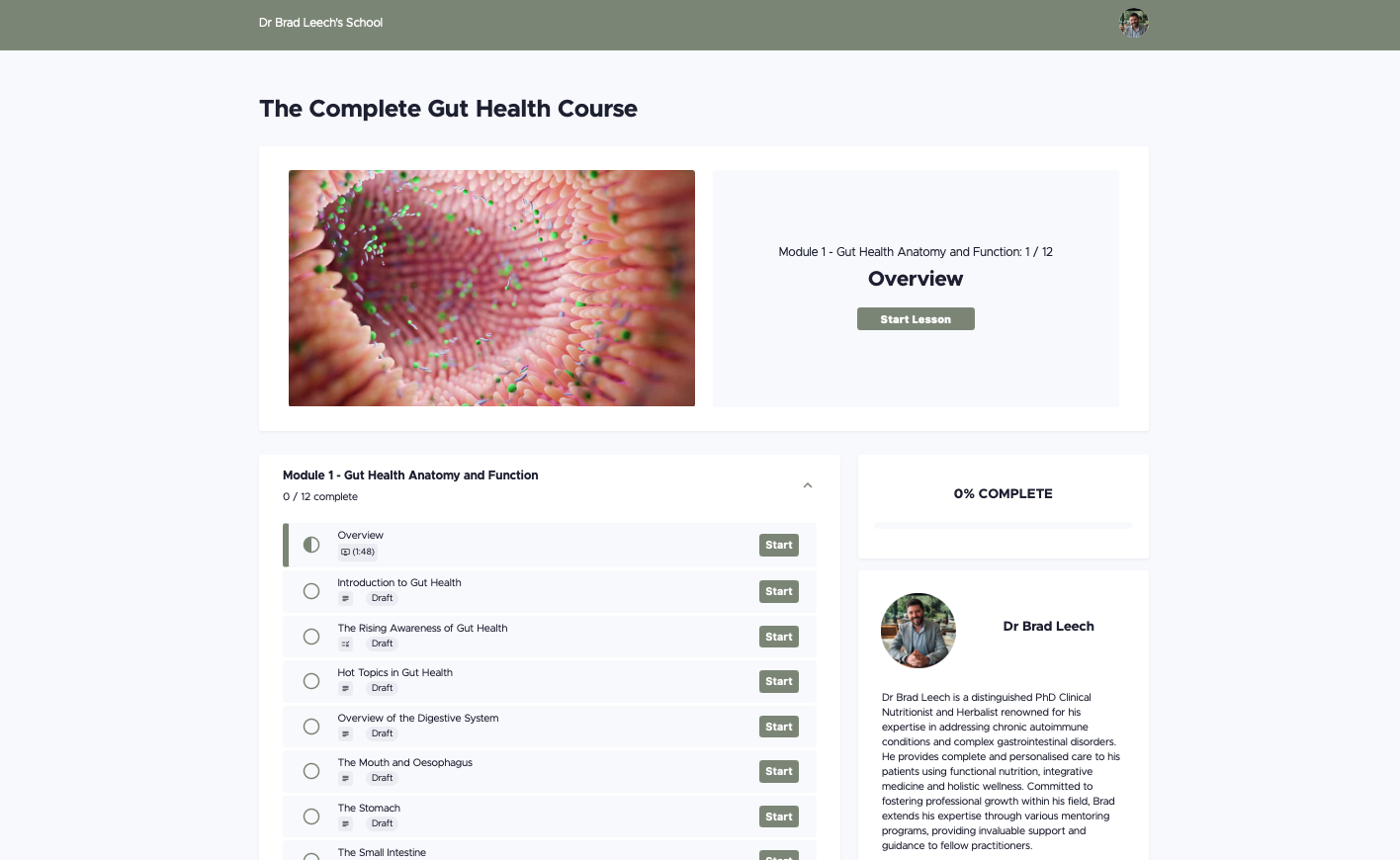
The Complete Gut Health Course
A structured gut-health education program grounded in clinical practice and evidence
This course provides a comprehensive exploration of the digestive system - what it does, how it works, what happens when it doesn’t work well, and how everyday nutrition and lifestyle choices support its function.
It is designed to help individuals build foundational gut-health literacy so they can better understand their body, ask informed questions, and work alongside a qualified practitioner with clarity and confidence.
This is a clinical-quality education pathway for people who want to understand their gut and support it appropriately.
The Complete Gut Health Course is a self-paced online gut health and microbiome course designed for everyday people who want clear, evidence-based gut education. Learn digestion fundamentals, common gut conditions (IBS, reflux, SIBO), microbiome basics, stool testing, and practical nutrition and lifestyle strategies—without overwhelm.
Who is the course for?
This course is ideal for:
Individuals wanting to understand their gut symptoms and physiology
Anyone wanting to support digestive health via evidence-informed nutrition and lifestyle foundations
Patients currently working with a practitioner who want structured learning between appointments
Students looking to build gut-function literacy
Topics Covered
Module 1 – Gut Health Anatomy & Function
In this foundational module, you’ll gain a clear and practical understanding of how your digestive system actually works.
We explore:
The organs involved in digestion (and each of their roles)
How food is broken down, absorbed, and utilised
The gut barrier and why “barrier integrity” matters
Introduction to the microbiome and its role in health
What “normal” digestion looks and feels like
Module 2 – Benefits of a Healthy Gut
What does optimal gut function truly look like — beyond being “symptom-free”?
In this module we look at:
Key hallmarks of a well-functioning digestive system
Digestive rhythms and patterns
Healthy bowel habits (and what’s not normal)
Positive microbial patterns associated with long-term wellbeing
The gut’s role in immunity, metabolism and mood
Module 3 – Common Gut Symptoms & Conditions
Not all bloating or discomfort means the same thing — and not every symptom needs fear, restriction or self-diagnosis.
This module walks you through:
What common symptoms might indicate
Contributing factors (diet, stress, environment, microbes, motility)
When symptoms point to something that needs practitioner support
The difference between IBS, SIBO, reflux & dysbiosis (explained simply)
Myths & misconceptions in gut health
Module 4 – Measuring your Gut Health
Curious about stool testing, microbiome reports, SIBO assessments or “leaky gut” tests?
You’ll learn:
The main ways gut health can be assessed
What microbiome tests measure (and what they don’t)
Key markers clinicians pay attention to (in plain language)
When breath tests are used
Food sensitivity testing — pros, cons, and cautions
Leaky gut testing and scientific validity
Module 5 – Gut & Systemic Health
The gut is connected to almost everything — but here we explain how and why, with research and realistic application.
We explore gut links to:
Mood and the nervous system
Hormones and reproductive health
Autoimmune conditions
Metabolic health and blood sugar regulation
Skin conditions
Immune system balance
Plus: key educational insights from emerging science
Module 6 – How to Improve you Gut Health
Here we translate learning into safe and evidence-based supportive strategies.
You’ll learn:
Dietary patterns that support gut function
Fibre, hydration, meal rhythm & chewing practices
Stress, sleep and nervous system considerations
When to avoid restrictive or elimination approaches
Module 7 – How to Change your Microbiome
What actually feeds a healthy microbiome? This module breaks down:
Prebiotics, resistant starches & dietary fibres
Fermented foods and when they’re helpful
How diet shapes the microbiome
Plant diversity and the “30-plant rule”
When probiotic support may play a role — and when to pause
Module 8 – Supplements to Improve Gut Health
Supplements can be powerful - but context and caution matter.
In this module you’ll learn:
When supplements may be appropriate - and when food comes first
Common gut-supportive nutrients explained (simply)
Safety considerations
Why personalisation matters
You’ll finish:
Confident knowing what supplements do (and what they don’t)
Able to have informed conversations with your practitioner
Clear on why supplements are tools - not solutions alone
Course Preview
Get a glimpse inside the learning experience by clicking the link below



